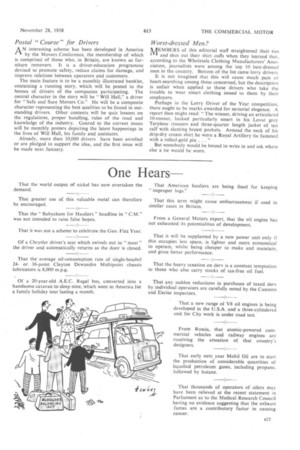One Hears
Page 33

If you've noticed an error in this article please click here to report it so we can fix it.
That the world output of nickel has now overtaken the demand.
That greater use of this valuable metal can therefore be encouraged.
That the " Babycham for Hauliers" headline in " C.M." was not intended to raise false hopes.
That it was not a scheme to celebrate the Geo. Fizz Year.
Of a Chrysler driver's seat which swivels out to " meet " the driver and automatically returns as the door is closed.
That the average oil-consumption rate of single-headed 24or 36-point Clayton Dewandre Multipoint chassis lubricators is 8,000 m.p.g.
Of a 20-year-old A.E.C. Regal bus, converted into a handsome caravan to sleep nine, which went to America for a family holiday tour lasting a month. That American hauliers are being fined for keeping "improper logs."
That this term might cause embarrassment if used in similar cases in Britain.
From a General Motors expert, that the oil engine has not exhausted its potentialities of development.
That it will be supplanted by a new power unit only if this occupies less space, is lighter and more economical to operate, whilst being cheaper to make and maintain, and gives better performance.
That the heavy taxation on dery is a constant temptation to those who also carry stocks of tax-free oil fuel.
That any sudden reductions in purchases of taxed dery by individual operators are carefully noted by the Customs and Excise inspectors.
That a new range of V8 oil engines is being developed in the U.S.A. and a three-cylindered unit for City work is under road test.
From Russia, that atomic-powered commercial vehicles and railway engines arc receiving the attention of that country's designers.
That early next year Mobil Oil are to start the production of considerable quantities of liquefied petroleum gases, including propane, followed by butane.
That thousands of operators of oilers may have been relieved at the recent statement in Parliament as to the Medical Research Council having no evidence suggesting that the exhaust fumes are a contributory factor in causing cancer_












































































































